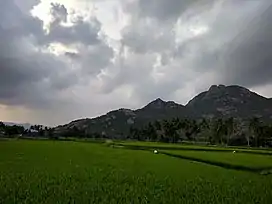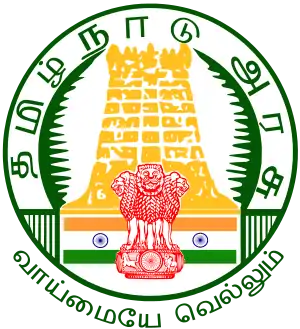Kallakurichi district
Kallakurichi is one of the 38 districts in the state of Tamil Nadu in India. The district headquarter is Kallakurichi. Kallakurichi District was announced on 8 January 2019 and it came into existence on 26 November 2019.[2][3]
Kallakurichi District | |
|---|---|
 Kalvarayan Hills from Arasampattu | |
Location in Tamil Nadu | |
| Coordinates: 11.738°N 78.962°E | |
| Country | |
| State | |
| Municipalities | Kallakurichi, Tirukoilur, Ulundurpet |
| Named for | Sugarcane, cotton, maize, tapioca |
| Headquarters | Kallakurichi |
| Largest City | Kallakurichi |
| Government | |
| • Type | District Administration, Kallakurichi |
| • Body | District Administration, Kallakurichi |
| • Collector | Sravan Kumar Jatavath, IAS |
| • Superintendent of Police | N.Mohanraj |
| Area Plain area | |
| • Total | 3,530.58 km2 (1,363.16 sq mi) |
| • Rank | 1 |
| Population | |
| • Total | 1,347,204 |
| • Density | 380/km2 (990/sq mi) |
| Languages | |
| • Official | Tamil |
| Time zone | UTC+5:30 (IST) |
| PIN | 606202 |
| Telephone code | 04151 04149 04153 |
| Vehicle registration | TN - 15 TN-32 |
| Website | kallakurichi |
History
During Ancient times, the region was under the rules of Cholas, Pallavas and various Local Chieftains like Tirukoilur king Malaiyaman. Due to its location between Chola naadu and Thondai naadu, the region was aptly called Nadu naadu (Mid-land). In later times, it passed between the hands of Gingee Nayaks, Arcot Nawabs. During the British Rule, the whole region was a part of the South Arcot District of Madras Presidency.
Prior to 1960, the town of Kallakurichi was considered a village. In 1960, Kallakurichi became a town panchayat, and then was subsequently upgraded to special-grade town panchayat. On 20 October 2004, it was further upgraded to the third-grade municipality. On 7 September 2010, the municipality was upgraded to first-grade municipality. On 8 January 2019, the region surrounding the municipality of Kallakurichi was announced as the 33rd district of Tamil Nadu by bifurcating Villupuram. The area of this municipality is 11.69 km2 divided into 21 wards.[4]
Geography
Kallakurichi District is bounded by Thiruvannamalai district in the north, Villupuram district in the east, Dharmapuri and Salem districts in the west, Perambalur and Cuddalore districts in the south. The greater part of the district is covered by the metamorphic rocks belonging to gneiss family. There are also three great groups of sedimentary rocks belonging to different geological periods. The Kalrayan Hills in the North represents a continuous range of hills covered with some thorny forests and vegetation, which are part of Eastern Ghats. Major rivers in the district include the Thenpennai, Manimukthar, Gomukhi, and Gadilam. Major source of irrigation is through lakes, canals and wells.
Kalvarayan Hills
The Kalvarayan Hills are a major range of hills situated in the Eastern Ghats. Along with the Pachaimalai, Alavaimalai, Javadi, and Shevaroy hills, they separate the Kaveri River basin to the south from the Palar River basin to the north. The hills range in height from 2000 feet to 3000 feet and extend over an area of 1,095 square kilometres.
Climate
The climate is moderate to hot, with the maximum temperature being 38 °C and the minimum at 21 °C. The District gets its rainfall from the northeast monsoon during the winter months and the southwest monsoon during the summer months. The average annual rainfall is 1,070 mm.
Politics
| District | No. | Constituency | Name | Party | Alliance | Remarks | ||
|---|---|---|---|---|---|---|---|---|
| Kallakurichi | 77 | Ulundurpettai | A. J. Manikannan | Dravida Munnetra Kazhagam | INDIA | |||
| 78 | Rishivandiyam | Vasantham K. Karthikeyan | Dravida Munnetra Kazhagam | INDIA | ||||
| 79 | Sankarapuram | T. Udhayasuriyan | Dravida Munnetra Kazhagam | INDIA | ||||
| 80 | Kallakurichi | M. Senthilkumar | All India Anna Dravida Munnetra Kazhagam | AIADMK | ||||
Divisions
The district is divided into the 6 taluks of Kallakkurichi, Sankarapuram, Chinnasalem, Ulundurpet, Tirukkovilur and Kalvarayan Hills.[5]
Administrative Divisions
Municipalities
1) Kallakurichi
2) Thirukovilur
3) Ulundurpet
Town Panchayats
1) Sankarapuram
2) Chinnasalem
5) Manalurpet
Unions
1) Kallakurichi
2) Sankarapuram
3) Thirukovilur
4) Rishivandiyam
5) Thiyagadurugam
6) Ulundurpet
7) Chinnasalem
8) Thirunavalur
9) Kalvarayanmalai
Demographics
At the time of the 2011 census, Kallakurichi district had a population of 13,47,204. Kallakurichi district had a sex ratio of 981 females per 1000 males. 197,385 (14.65%) lived in urban areas. Scheduled Castes and Scheduled Tribes made up 30.56% and 3.74% of the population respectively. Most tribals are Malayalis who live in the Kalavarayan Hills.[6]
Hindus are the majority religion with 91.03% of the population. Christians, who are mostly Dalits and live in rural areas, are 4.45% of the population. Muslims are 4.24% of the population, living predominantly in urban areas.[7]
Tamil is the predominant language, spoken by 95.97% of the population as their mother tongue. 2.48% of the population speaks Urdu and 1.38% Telugu as their first language.[8]
Economy
Kallakurichi is an emerging agricultural district. It is also known as "Home of Agriculture". There are numerous rice-processing units or modern rice mills, both small and big throughout the district. Textiles, jewellery and agricultural feeds are major businesses. The District has two government co-operative sugar mills and one private sugar mill, and one solvent extraction plant. There are many poultry farms in and around Kallakurichi. The name is derived due to the green nature of this town along the banks of the river Gomuki which nourishes the town by its water.
Education
The District has numerous colleges and schools, both government and private. Notable colleges are Government Kallakurichi Medical College,Government arts college, Polytechnic college in Sankarapuram, A.K.T Engineering College. There was an announcement by the Chief Minister of Tamil Nadu in March 2020 to build a medical college with the initial funding of 370 crores near Pumputhottam, in Siruvangur village, which is 3.5 kilometers from Kallakurichi town and 1st batch of 150 students have started from the academic year 2021/2022.
Transport
The District is connected by roads and railways to major cities and to the rest of the state. The major roads are, National Highway, NH – 79 connecting Salem to Ulundurpet, The District is connected by Railway through Chinnasalem Railway Station on Salem – Vridhachalam Railway Line.
NH-79 Salem-Kallakurichi-Ulundurpet
NH-534 Chinnasalem-Veppur-Vridhachalam
SH-9 Cuddalore-Panruti-Tirukoilur-Tiruvannamalai-Vellore
SH-9A Tiruvannamalai-Thiyagadurugam
SH-6 Kallakurichi-Sankarapuram-Tiruvannamalai
SH-68 Cuddalore-Thirukovilur-Sankarapuram
SH-69 Vridhachalam-Ulundurpet-Villupuram
SH-7 Thirukoilur-Villupuram
SH-204 Kallakurichi-Koothakudi-Trichy
SH-211 Thirukovilur Byepass Road -Kandachipuram
SH-245 Kallakurichi-Kachirayapalayam-Sankarapuram
SH-137 Thirukoilur-Asanur
SH-246 Tirukkovilur- Thiyagadurgam
See also
References
- புதிதாக பிரிக்கப்பட்ட கள்ளக்குறிச்சி மாவட்டம் இன்று உதயம் (in Tamil). News7 Tamil. 25 November 2019. Retrieved 30 November 2019.
- "Tamil Nadu govt announces creation of Kallakurichi District. Kallakurichi is all set to become Tamil Nadu's 33rd district. Chief Minister Edappadi K Palaniswami made the announcement on the floor of the assembly on Tuesday". Times of india. Retrieved 8 January 2019.
- "Kallakurichi is 33rd district of T.N." The Hindu. 9 January 2019. ISSN 0971-751X. Retrieved 12 June 2019.
- "Tamil Nadu has a new district: Kallakurichi will be 33rd". Hindustan Times. 9 January 2019. Retrieved 12 June 2019.
- "District Map | Kallakurichi District, Govt. Of Tamil Nadu, | India".
- "District Census Handbook 2011 - Viluppuram" (PDF). Census of India. Registrar General and Census Commissioner of India.
- "Table C-01 Population By Religion - Tamil Nadu". census.gov.in. Registrar General and Census Commissioner of India.
- "Table C-16 Population by Mother Tongue: Tamil Nadu". censusindia.gov.in. Registrar General and Census Commissioner of India.
